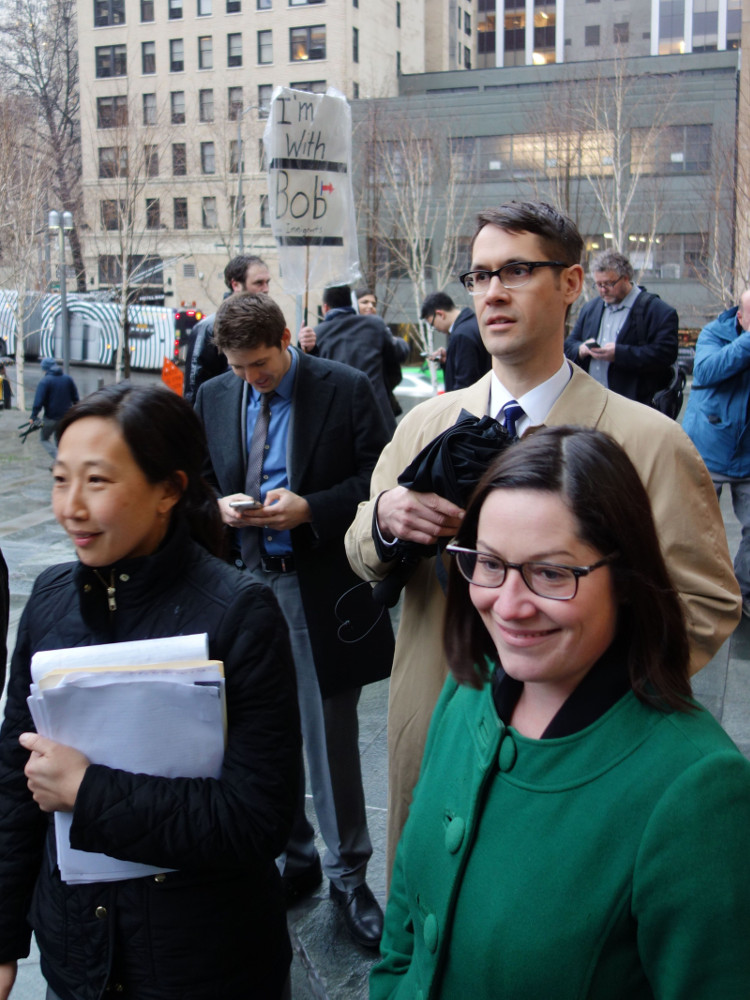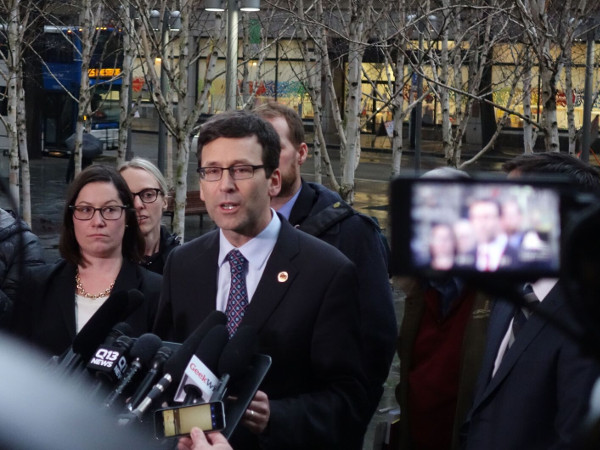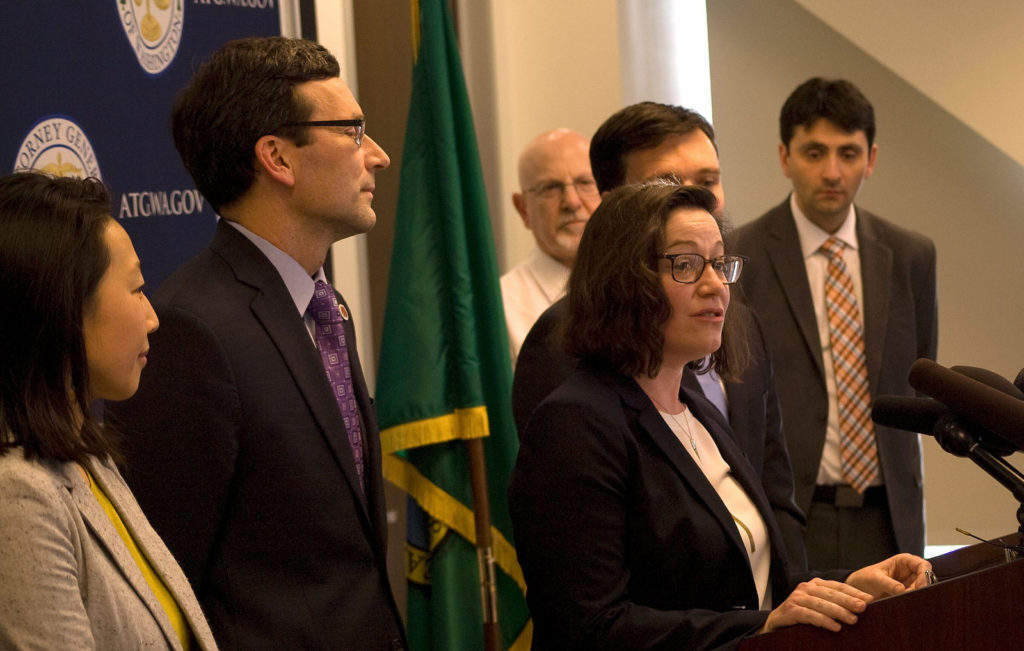Colleen Melody and Marsha Chien are coordinating Washington state’s legal fight against Trump’s orders on immigration and civil rights
As the first two attorneys employed in the newly formed Wing Luke Civil Rights Unit—a division of the Washington Attorney General’s office set up to litigate and investigate civil rights violations for the state’s citizens—unit chief Colleen Melody and assistant attorney general Marsha Chien had a blank slate to decide which cases they wanted to take on. That was in 2015, and Attorney General Bob Ferguson thought that Washington should join the ranks of many other states, including Oregon and California, that have attorneys dedicated to investigating and enforcing state and federal civil rights law on behalf of the State of Washington.
Mere weeks into 2017, however, the division’s “blank slate” was getting crowded, as new President Donald J. Trump began to sign executive orders, among them the infamous “travel ban”—the name given to the order that would ban immigration and refugees from certain, mostly Muslim, countries. Then came the memo to stop transgender people from joining the military and the rescinding of Deferred Action for Childhood Arrivals (DACA)—which would revoke protections for the children of undocumented immigrants—in September.

Powered by the attorneys of the Civil Rights Unit, Attorney General Bob Ferguson stepped into the national spotlight to challenge the travel ban. The office has filed suit against rescinding DACA as well, which is currently in process.
“Within seven days of inauguration day, our docket had changed remarkably because of these federal policies, many of which are illegal and that we think really significantly and obviously impact people in Washington,” says Melody.
It was a little shocking, says Chien. “We just didn’t see that the civil rights of Washingtonians would be attacked by the federal government, necessarily, in 2015.”
But in addition to those federal, national headline-grabbing cases, Melody, Chien and the rest of the Civil Rights Unit—now comprised of six lawyers, two legal assistants, a paralegal and an investigator, manage a full plate of state cases as well. “We’re not moving away from the cases that we’ve always wanted to do—we’re just doing both,” says Melody.
That matter-of-fact “just” makes it sound deceptively easy—but of course, it’s not. “Some of the cases that we think are the most important and are the most fulfilling are cases that may not be big headline cases but that push the law in a small way for a group of people who haven’t typically had government come to their side,” says Melody. They tackle cases that private firms can’t, often because there isn’t a lot of money in it. Housing and public accommodation cases in particular often fall into this category.
To that end, Chien recently handled a round of cases involving the legality of blanket bans on people with criminal convictions applying for housing. “Housing’s a basic human right;” says Melody, “everyone has to have somewhere safe and affordable to live, in order for someone to do the—whole rest of their life. And this was excluding whole groups of people from having housing opportunities.”
Chien is also, with another assistant attorney general in the unit, La Rond Baker, suing one of the largest private prison operators in the U.S., The GEO Group, for failing to pay detainee workers at the Northwest Detention Center state minimum wage—they pay $1 for tasks, such as janitorial or kitchen work, and assert that these are voluntary jobs. U.S. District Judge Robert Bryan denied the company’s motion to dismiss the case in December, so the state can continue to pursue the lawsuit.
“Part of our job is to emphasize the strong civil rights protections that the legislature has already provided to this state,” says Melody. Washington has broader and better protections than those at the federal level for some vulnerable groups: LGBT people, people with disabilities, or people facing discrimination because of marital status or age. “We’re trying to sort of do it all right now, because I think we have to,” says Melody.
Civil rights law was a natural fit for both Chien and Melody, for different reasons.
Colleen Melody didn’t know any lawyers growing up in eastern Washington—but her personality made it clear she was well-suited for the profession: as a child, she was known to present her parents with point-by-point arguments outlining why she shouldn’t be punished for transgressions. In high school Melody joined a peer mediator program where she learned to resolve classmate disputes, and in a program sponsored by the Spokane County Prosecutors Office, she helped mediate juvenile criminal cases.
“When the travel ban came out it really— there’s obviously a lot of parallels to the Chinese Exclusion Act [U.S. federal law in 1882 that prohibited immigration of Chinese laborers]. To think that my dad, who has a framed picture of Ronald Reagan’s family on his wall, is not American, or people similar to my dad were not American, just felt wrong.”
One especially formative experience that sealed the deal for Melody was watching, up close, what transpired in Hayden, Idaho, where her family took summer vacations. For decades, Hayden played host to an Aryan Nations gathering at a 20-acre compound. It regularly generated a lot of media coverage, frustrating Melody. In 2000, the Southern Poverty Law Center teamed up with Coeur d’Alene attorney Norm Gissel to sue compound owner Richard Butler for assaulting a mother and her son who had stopped in front of his property to search for a lost wallet. The $6.3 million judgment bankrupted him and he lost the property. It was the first time Melody saw how the law “can change a really significant, stressful and ongoing problem that can face a community.”
That feeling persisted and propelled her on to law school. She thought she would become an immigration lawyer. But while doing volunteer work at a day center in Seattle for Spanish-speaking laborers, as well as immigrant defense work for asylum cases, she changed her mind, listening to her clients tell their stories of powerlessness. “[Clients] would experience these acts of harassment or [people] taking advantage of them in many areas of their lives. They would get ripped off by landlords who would keep their damage deposit because they knew there was no remedy for somebody to go to housing court to get it back. I heard about employers who wouldn’t pay them at the end of a workday because they knew there was no meaningful way for them to assert their rights.
“I heard these stories so many times that when there came an opportunity after I was done clerking to apply for a job in the civil rights division in Washington D.C. [at the U.S. Department of Justice], that seemed like a good way to maybe get at these cases from a bigger level, to bring what the Department of Justice calls ‘pattern of practice’ cases, where you might be able to address the rights of a group of people rather than one at a time.”
Melody feels extremely fortunate that the Civil Rights Unit came along when it did. “I enjoyed living in D.C.,” she says, and she hadn’t been looking for a new job. “I think that my work would be a lot different if I was still working for the Justice Department now. I’m pretty grateful to be sitting where I am.”
Marsha Chien thought she’d work in foreign service or human rights law. Born in the U.S. to Taiwanese parents who emigrated, her father talked a lot about what it meant to be American while she was growing up in Virginia, she says. “He listened to Voice of America in Taiwan, he was in a rock band. When he came to the United States he had lots of dreams about what it would be like and when he naturalized he framed a picture of Ronald Reagan’s family in our hallway—not a picture of me, just a picture of Ronald Reagan’s family,” she says with a laugh.
Chien joined the Peace Corps after getting an economics degree from Georgetown University’s School of Foreign Service. She was sent to a Mayan village, Chirrepec, in Guatemala, where she helped a tea cooperative with agricultural marketing and business development. The two years there gave Chien a small taste of being an immigrant somewhere, and an appreciation for what it must have been like for her parents, who had been doing it for a lifetime.
She thought she wanted to practice human rights law, but working at the International Criminal Tribunal for the former Yugoslavia (ICTY) for a summer, she says, felt disconnected from her own experiences and didn’t seem a good opportunity to make a big impact. So she switched her focus to civil rights law and the West Coast, where she landed as a staff attorney with the San Francisco Legal Aid Society’s Employment Law Center.
Chien was looking to move to Seattle when, in 2015, she saw a job opening at the budding Wing Luke Civil Rights Unit and jumped at the opportunity. She was the division’s second hire. She notes that on the West Coast, the Asian American community is older than that on the East Coast and much more politically active and integrated into government and positions of power. “What’s great about Seattle,” she says, “are all these really strong Asian American organizations that aren’t run by people my age but by the generation above.” Indeed, Wing Luke, the division’s namesake, was part of that generation. He was a civic-minded and pioneering Chinese American who served as a Washington assistant attorney general for five years. Afterwards, in 1962, he was the first person of color to be elected to the Seattle City Council, making him the first Asian American elected to public office in the Pacific Northwest.
If work in civil rights law—particularly public or non-profit sector—was limited, work in a brand-new division, and with power to direct what some of that work would be, was an extremely rare find. For both lawyers, this was a golden opportunity. “In almost any other context you’re going to have restrictions on what the priorities are,” Chien says. “In the non-profit world, you have: ‘This is what the funders are funding right now,’ whereas when this [office] was created, we got to think about what are important issues.”
When Melody and Chien sat down for this interview, it was during a rare window of free time for them—and the day after the U.S. Supreme Court announced its decision to allow the administration’s travel ban to take effect. It was the third iteration of the extremely controversial edict, issued in September that placed varying restrictions on foreign nationals from eight countries: Chad, Iran, Libya, North Korea, Somalia, Syria, Venezuela, and Yemen.
Immigration is a hugely important issue to Chien. “When the travel ban came out it really— there’s obviously a lot of parallels to the Chinese Exclusion Act [U.S. federal law in 1882 that prohibited immigration of Chinese laborers]. To think that my dad, who has a framed picture of Ronald Reagan’s family on his wall, is not American, or people similar to my dad were not American, just felt wrong,” says Chien.

Chien is weary, and a little emotional, when she talks about the nearly year-long travel ban fight: “Obviously working on the travel ban is probably going to be one of the highlights of my career. It was a great honor and just awesome to be working on something that had an immediate change. You go to three years of law school to do about a month of really hard-core litigation work.
“And to see that get diluted over time over the course of the last 10 months and ultimately end up right now is a challenge,” she admits. “Obviously, I think it stood for something that you can use the law to protect people; but it is definitely a tough break. Having to follow the news so closely—you have to read all of the terrible things people say, particularly our president. It can be a little bit soul-crushing, especially to have to quote it and put it in a complaint over and over again.” She says starting work on challenging the DACA reversal felt similarly challenging, and “combing through statements that were really hurtful to people’s dignity” is tough work.
“I’m very aware right now of the limits of law,” adds Melody. “Even if we win [lawsuits] I don’t think that we can use the law as a tool to keep some of the most vulnerable and targeted communities from feeling really scared. They’re just moms and dads or employees or people trying to live their daily lives who are also hearing, at the national level sometimes, that they’re going to be targeted because of who they are.”
Such intense work leaves little opportunity for either Chien or Melody to separate work from home life. Chien, for her part, is trying. She has twins due to arrive later this winter and jokes about how self-care has finally been imposed on her via doctor appointments.
“I can come up with some hobbies. I mean—I haven’t yet, but I should! I bought a couple books that I plan to read on maternity leave,” she says with a laugh.
“I got a piano, did I tell you?” Melody tells Chien, revealing a little of their easy rapport, developed in the more than two years they’ve worked together. “I played it once. I got it in September. It’s a beautiful piece of art that sits in my living room. Sometimes I dust it.”
Joking about would-be-hobbies aside, Melody says, she’s not too interested in taking breaks these days. “I don’t have a hard time getting out of bed in the morning and getting to work; there are no feats of logic required to connect how my work matters or doesn’t every day right now. And I think that is both empowering [and] really motivating.”
If 2017 was an indicator of what the Civil Rights Unit will be working on for the time to come, Melody and the team are ready. “We see, it seems like every day,” she says, “the Department of Justice, the Department of Education, the Department of Defense, other federal entities—revising or revisiting the civil rights protections that in some cases they have said for decades apply. In Washington, our responsibility then has to be to say, ‘That’s fine, those protections still exist here.’ And we will uphold them using state law if the federal government won’t do its job under federal law.”
Niki Stojnic has been a Seattle-based writer and editor for 17 years, covering trends, personalities, health, history and much more. Follow her on Twitter @NikiStojnic.
Photo credits: all images courtesy of Washington State Office of the Attorney General.
Did you find this article informative? If so, please take a moment to help support the journalists who make stories like this possible:

